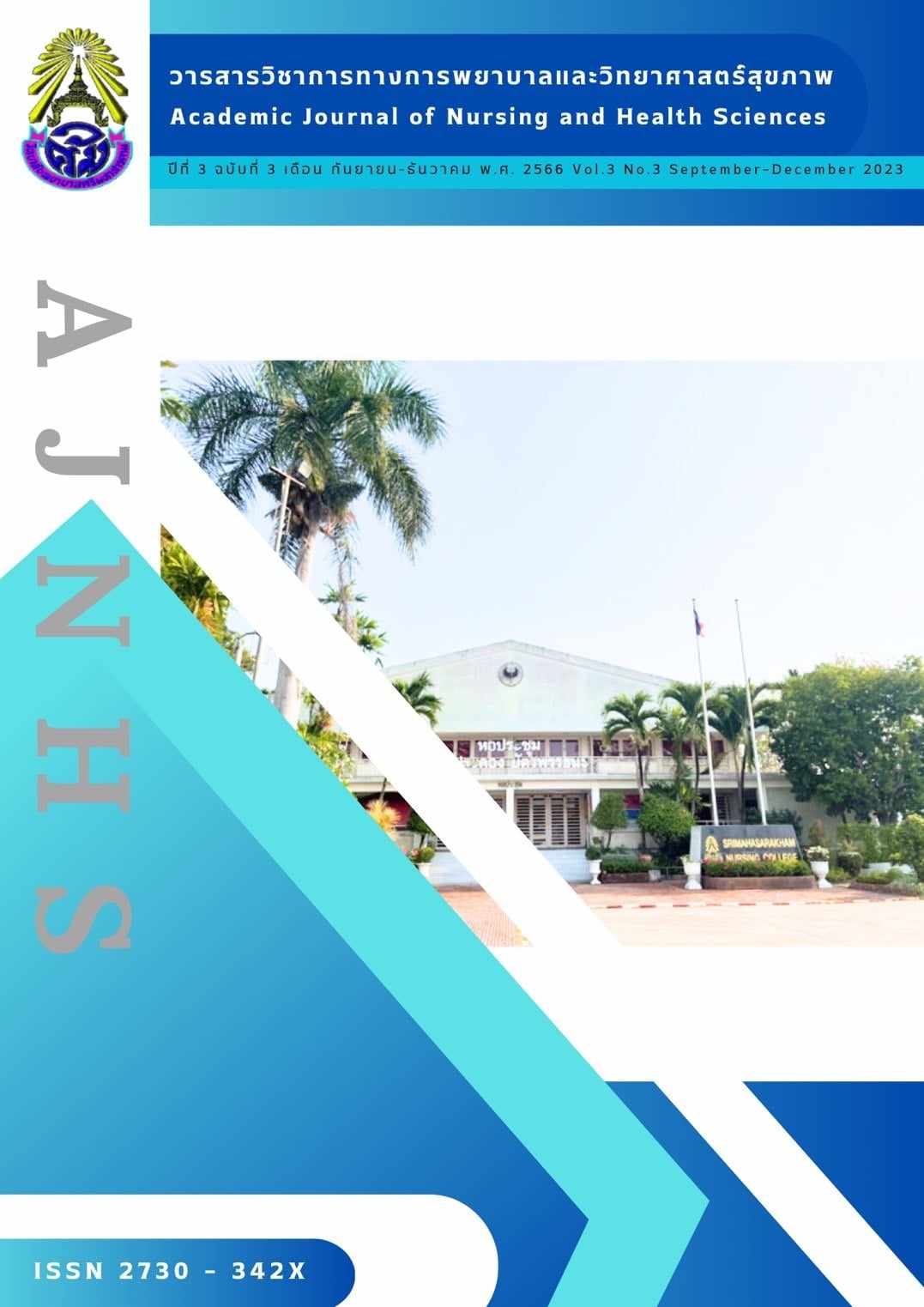Effects of Self-management and Motivational Interviewing Program for Delayed Progression of Chronic kidney disease among Type 2 Diabetic Patients
Keywords:
Self-management, Motivational Interviewing, Delayed Progression of Chronic kidney diseaseAbstract
This research is a quasi experimental research with a single group pretest and posttest design (The One Group Pretest - Posttest Design) to study the Effects of Self-management and Motivational Interviewing Program for Delayed Progression of Chronic kidney disease among Type 2 Diabetic Patients. The sample group consisted of type 2 diabetic patients with stage 3 kidney deterioration who received services at Kamalasai Hospital. February 2023 to August 2023.A purposively selected sample of 30 people received a self-management program combined with motivational interviews. which was developed according to the concept Creer's (2000) self-management combined with interviews.To build on the motivation of Miller and Rollnick (1991), Data were collected using a chronic kidney disease knowledge test, Health behavior management assessment form to delayed progression of chronic kidney disease and clinical outcome assessment form Glomerular Filtration Rate (eGFR), Fasting Blood Sugar (FBS), Cumulative Average Blood Sugar (HbA1C), Systolic Blood Pressure Blood Pressure Diastolic Data were analyzed using descriptive statistics. and inferential statistics to compare the average results of interest before and after participating in the program with Paired t-test statistics, Setting the statistical significance level at 0.05.
The results of the study found that the majority of the sample were female, 18 cases (60.00%), average age 58.30 years (SD. 7.49), comorbidities were diabetes and blood pressure, 26 cases (86.67%).After processing, the sample group has knowing about chronic kidney disease and self-management behavior to delayed progression of chronic kidney disease was significantly higher at the 0.05 level. Average glomerular filtration rate (eGFR), fasting blood sugar (FBS), cumulative average blood sugar (HbA1C) ) Systolic blood pressure and Diastolic blood pressure. After the operation, the decrease was statistically significant. Therefore, from this research, it is suggested that Diabetic clinic nurse, Chronic Kidney Disease Clinic have to use Self-management and Motivational Interviewing Program for Delayed Progression of Chronic kidney disease among Type 2 Diabetic Patients with stage 3 kidney degeneration to delay further kidney deterioration from diabetes.
References
จันจิรา หินขาว, ขนิตฐา หาญประสิทธิ์คำ และสุนทรี เจียรวิทยกิจ. ( 2562). ผลของโปรแกรมการจัดการตนเองร่วมกับการสัมภาษณ์เพื่อสร้างแรงจูงใจ เพื่อชะลอไตเสื่อมจากเบาหวานต่อพฤติกรรมการจัดการตนเองและผลลัพธ์ทางคลินิก ในผู้ป่วยเบาหวานชนิดที่ 2 ที่มีความเสื่อมของไตระยะที่ 3.วารสารวิทยาลัยพยาบาลพระปกเกล้าจันทบุรี, 30(2), 185-210.
จุฑามาศ เทียนสะอาด และนิโรบล กนกสุนทรรัตน์. (2559). การสัมภาษณ์เพื่อสร้างแรงจูงใจ แนวคิด และการประยุกต์ใช้ในผู้ป่วยโรคเรื้อรัง. รามาธิบดีพยาบาลสาร, 22(3), 223-232.
รัตนาภรณ์ จีระวัฒนะ,และอภิญญา ศิริพิทยาคุณกิจ.(2559). การพัฒนาความสามารถในการดูแลตนเองของผู้ป่วยเบาหวานที่กลัวภาวะน้ำตาลต่ำในเลือด จากการฉีดอินซูลิน: กรณีศึกษา.รามาธิบดีพยาบาลสาร, 22(3), 233-246.
วรวรรณ ชัยลิมปมนตรี และสุรศักดิ์ กันตชูเวสศิริ. (2559). ตำราโรคไตเรื้อรัง. กรุงเทพฯ: เท็กซ์แอนด์ เจอร์นัลพับลิเคชั่น.
วรางคณา พิชัยวงศ์. (2558). โรคไตจากเบาหวาน. วารสารกรมการแพทย์, 40(5), 19-24.
ศรีเพ็ญ สวัสดิมงคล. (2564). รายงานประจำปี2565 ของสำนักโรคไม่ติดต่อ. กรุงเทพฯ:สำนักงานกิจการโรงพิมพ์องค์การสงเคราะห์ทหารผ่านศึก ในพระบรมราชูปถัมภ์.
ศิริลักษณ์ ถุงทอง. (2557). ผลของโปรแกรมสนับสนุน การจัดการตนเองเพื่อชะลอไตเสื่อมจากเบาหวานต่อพฤติกรรมการจัดการตนเองและผลลัพธ์ทางคลินิก ในผู้ป่วยเบาหวานชนิดที่2 ที่ไม่สามารถควบคุมระดับน้ำตาลในเลือดได้(วิทยานิพนธ์ปริญญา มหาบัณฑิต). มหาวิทยาลัยสงขลานครินทร์.
สมาคมโรคเบาหวานแห่งประเทศไทย ในพระราชูปถัมภ์ สมเด็จพระเทพรัตนราชสุดาฯสยามบรมราชกุมารี. (2566). แนวเวชปฏิบัติสำหรับโรคเบาหวาน. กรุงเทพฯ: ร่มเย็น มีเดีย.
สมาคมโรคไตแห่งประเทศไทย. (2558). คำแนะนำสำหรับการดูแลผู้ป่วยโรคไตเรื้อรังก่อนการบำบัดทดแทนไต พ.ศ. 2558. สืบค้นจาก http://www.nephro thai.org/images/10-11-2016/Final_%E0%B8%84%E0%B8%A1%E0%B8%AD_CKD_2015.pdf.
Cohen, J. (1988). Statistical power analysis for the behavioral sciences (2nded.). Hillsdale, NJ: Lawrence Erlbaum Associates.
Creer, L. T. (2000). Self- managementof chronic illness. In M. Boekaerts, P. R. Pintrich, & M. Zeidner (Eds.). Handbook of self-regulation (pp. 601-629). San Diego, CA: Academic Press.
Miller, W. R., & Rollnick, S. (1991). Motivational interviewing : Preparing people to change addictive behavior. New York: Guilford Press.
Song, D., Xu, T. Z., & Sun, Q. H. (2014). Effect of motivational interviewing on self-management in patients with type 2 diabetes mellitus: A meta-analysis. International Journal of Nursing Sciences, 1(3), 291-297.
Zoppini, G., Targher, G., Chonchol, M., Ortalda, V., Negri, C.,Stoico, V., & Bonora, E. (2012). Predictors of estimated GFR decline in patients with type2diabetesandpreserved kidney function. Clinical Journal of the American Society of Nephrology, 7(3), 401-408
Downloads
Published
How to Cite
Issue
Section
License
Copyright (c) 2023 Srimahasarakham Nursing College, Faculty of Nursing, Praboromarajchanok Institute

This work is licensed under a Creative Commons Attribution-NonCommercial-NoDerivatives 4.0 International License.


